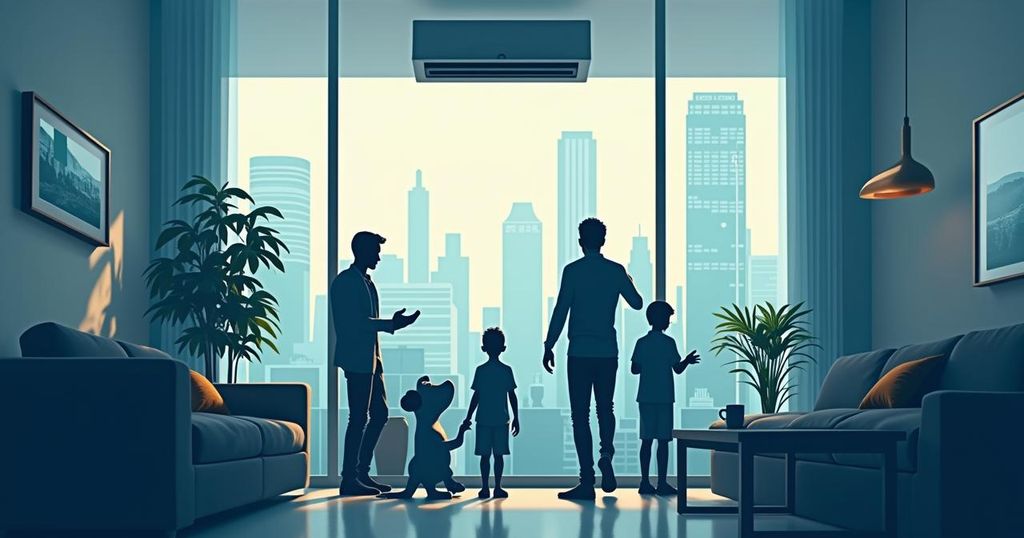Air conditioning has transformed urban development and economic growth, yet only a small percentage of those in hot climates have access to it. This limited access hinders productivity and increases heat-related deaths. Despite concerns regarding energy consumption and environmental impact, improved efficiency could facilitate broader access, making AC a moral imperative to address current and future climate challenges.
Air conditioning has fundamentally reshaped modern civilization, playing a crucial role in urban development and economic growth across the globe. Cities like Singapore and Dubai owe their rise in part to this technology, while in the United States, cooling systems have driven the phenomenal growth of the Sun Belt. Yet, despite its transformative impact, access to air conditioning remains alarmingly limited. According to recent studies, only 8 percent of the 2.8 billion individuals residing in the hottest regions of the world have air-conditioned homes. For example, in 2018, merely 5 percent of households in India had air conditioning, in stark contrast to over 90 percent in the United States and Japan. Countries like South Africa and Indonesia are similarly underserviced with just 6 percent and 9 percent coverage, respectively. The notion of universally available air conditioning can create moral dilemmas among environmental advocates. As Pope Francis noted, it exemplifies humanity’s increasing consumption habits that harm the planet. However, it must be recognized that extreme heat does stifle development. Research has shown that such conditions diminish worker productivity, national output, and disposable income, with impacts as severe as a projected loss of 2 percent of global working hours due to rising temperatures. In areas like Southern Asia and Western Africa, this figure could escalate to 5 percent. Moreover, heat-related fatalities have notably increased, with a 68 percent rise in related deaths within the past two decades, resulting in an estimated 12,000 deaths annually today. Preventative measures, such as the widespread adoption of air conditioning, have drastically reduced mortality rates in the United States. For those in developing nations, particularly in urban India and Indonesia, air conditioning is increasingly becoming an essential necessity rather than a luxury. As these nations continue their ascent on the economic ladder, their need for air conditioning will only grow. Climate change exacerbates this urgency, as heatwaves become more prolonged and intense. The International Energy Agency (IEA) anticipates that by 2050, the global number of air conditioning units will surge to approximately 5.5 billion, up from 2.3 billion today. However, this growth presents significant challenges, particularly in terms of energy consumption. Air conditioning currently accounts for about 7 percent of the world’s electricity use, and greater ownership could augment carbon emissions substantially—projected to triple among the top 25 electricity-consuming nations by 2050. Such growth poses a contradiction to efforts aimed at mitigating climate change. The current year is shaping up to be the hottest on record, and while some maintain optimism about keeping global warming under 1.5 degrees Celsius, more realistic forecasts predict an increase of up to 3 degrees by the year 2100. Such a circumstance would necessitate ongoing adaptation efforts, particularly for the world’s largest cities, many of which would experience extended heat waves. Inevitably, the challenge of climate change cannot justify denying billions access to life-saving air conditioning systems. Addressing this issue is paramount for alleviating not just poverty and inequality but also the detrimental effects of extreme heat. Fortunately, enhancing access to air conditioning technology does not require groundbreaking innovations, as the IEA indicates that improving efficiency could reduce projected energy demands by 45 percent by 2050. The necessity for air conditioning is evident, and it is a vital component in ensuring livable conditions in a warming world, demanding immediate and concerted action to expand its accessibility.
Air conditioning (AC) has been a key factor in urban development and economic advancement, notably in hot climates. While AC has transformed environments and enhanced productivity in developed nations, its accessibility remains significantly low in poorer countries. The rising temperatures due to climate change further necessitate the need for such technology, presenting a moral challenge to ensure widespread access while also addressing environmental concerns. To combat this issue, improving the efficiency of existing technologies will be essential in balancing energy consumption and accessibility.
Access to air conditioning is becoming increasingly vital in response to rising global temperatures and the need for enhanced productivity and health in hotter regions. While it poses energy consumption challenges, strategies to improve efficiency can mitigate its environmental impact. Collective action is crucial to ensure equitable access to essential cooling technologies for the billions currently lacking this necessity, particularly in developing nations.
Original Source: www.washingtonpost.com







